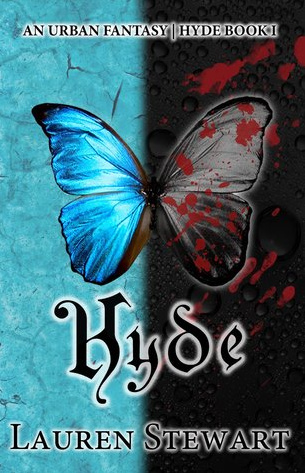

“Hope is nice. Fucking useless in this situation, but still nice. You have one sentence before you start bleeding. Make it good.”
― Lauren Stewart, quote from Hyde
“Relationships are complicated."
"Not all of them. For instance, our relationship is very simple. You are annoying; I am annoyed. See? Totally uncomplicated.”
― Lauren Stewart, quote from Hyde
“Mitch thought she looked like an angel might—if the angel had fallen very hard into a very naughty position.”
― Lauren Stewart, quote from Hyde
“All of us hate to be caged, Mitch. For Hyde, and maybe Chastity, it’s necessary. But for the rest of us, it’s a choice.” Eden stalked out, wondering which choice she was making.”
― Lauren Stewart, quote from Hyde
“She really never lies?"
"Never."
"How is that possible?" Mitch leaned back in his chair. "I lie before breakfast. And, if no one else is around, I lie to myself.”
― Lauren Stewart, quote from Hyde

“They played, laughed, and teased until the moment she slid him inside of her. When his world stopped. Everything he'd ever known. Everything he'd ever been disappeared in that one moment.”
― Lauren Stewart, quote from Hyde
“Stop doing that." He motioned at her face. "Don't- Argh! Alright! There's something else. Just turn off the sprinklers.”
― Lauren Stewart, quote from Hyde
“When you visited my office the other day, did I accidentally say I couldn't wait to see you again? Because if so, I left out a word. I meant to say: I can't wait to see you never again.”
― Lauren Stewart, quote from Hyde
“She’d built her entire life around the idea that the only thing she could control was herself—her actions, her words. And, if she did the right thing, other people would somehow treat her with the same respect. But it wasn’t true, now, was it? Her decency made no difference at all in anyone’s life but hers.”
― Lauren Stewart, quote from Hyde
“She was nice, and, while nice people often end up last, they don’t inspire violence in others.”
― Lauren Stewart, quote from Hyde

“I should not be surprised," said Mr. Graham, "that the day should come when men will refuse to believe in God simply on the ground of the apparent injustice of things. They would argue that there might be either an omnipotent being who did not care, or a good being who could not help, but that there could not be a being both all good and omnipotent or else he would never have suffered things to be as they are.”
― George MacDonald, quote from The Fisherman's Lady
“...she could see it now, what her father loved about Shakespeare, about that entire, mysterious time, with its pomp and majesty, secrets and betrayals.”
― Elise Broach, quote from Shakespeare's Secret
“As the reputation of books is raised not by their freedom from defect, but the greatness of their beauties, so should that of men be prized not for their exemption from fault, but the size of those virtues they are possessed of.”
― Oliver Goldsmith, quote from The Vicar of Wakefield
“Information, as narrowly defined by Shannon, concerns the predictability of a message source. In the real world, however, information is something that is analyzed for meaning, that is remembered and combined with other information, and that produces results or actions. In short, information is processed via computation.”
― quote from Complexity: A Guided Tour
“Even in a city as small as Ferrara, you can manage, if you like, to disappear for years and years, one from another, living side by side like the dead”
― Giorgio Bassani, quote from The Garden of the Finzi-Continis
BookQuoters is a community of passionate readers who enjoy sharing the most meaningful, memorable and interesting quotes from great books. As the world communicates more and more via texts, memes and sound bytes, short but profound quotes from books have become more relevant and important. For some of us a quote becomes a mantra, a goal or a philosophy by which we live. For all of us, quotes are a great way to remember a book and to carry with us the author’s best ideas.
We thoughtfully gather quotes from our favorite books, both classic and current, and choose the ones that are most thought-provoking. Each quote represents a book that is interesting, well written and has potential to enhance the reader’s life. We also accept submissions from our visitors and will select the quotes we feel are most appealing to the BookQuoters community.
Founded in 2023, BookQuoters has quickly become a large and vibrant community of people who share an affinity for books. Books are seen by some as a throwback to a previous world; conversely, gleaning the main ideas of a book via a quote or a quick summary is typical of the Information Age but is a habit disdained by some diehard readers. We feel that we have the best of both worlds at BookQuoters; we read books cover-to-cover but offer you some of the highlights. We hope you’ll join us.